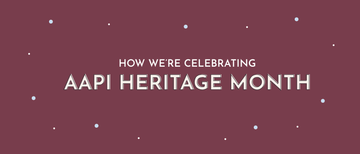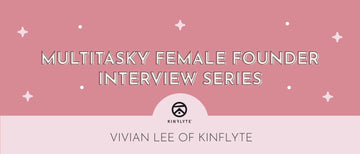How We're Celebrating AAPI Month

Even though we’re sharing the stories of our incredible team members, it’s important to note that this year has been challenging for the AAPI community. With the coronavirus prejudice and violent attacks, the AAPI community has had to find strength and come together during these tumultuous times. We’re celebrating the stories of our AAPI team members but also the incredible resilience they’ve shown during this challenging year.
The AAPI community is diverse and full of stories, so today, we wanted to highlight our founder Julia Xu along with Corina and Kelly from the Multitasky team.

Julia’s Story
(Founder—aka the one who’s staying up all night, supporting the team, rallying the troops, coming up with new ideas and making Multitasky so much fun!)
“I was born in California but moved back to China when I was young, so kind of the 'opposite experience.' Being raised in Beijing, I started in an international school but then attended a traditional Chinese school for middle school and beyond. Post middle school, there weren’t many people to speak English with, so I studied it myself at night, so I’d continue to improve. I then came back to the US and went to Brown University.
I am the only person in my immediate family that speaks English and lives outside of China (yep, I’m in the US all by myself).
Being so immersed in both English and Chinese both feel natural to me, but sometimes it drives me crazy. I switch between the two languages constantly and even dream in both. Chinese culture and American culture are dramatically different, yet I feel like I am fully immersed in both. I have an identity crisis every now and again, but usually, it feels like I’m just switching two hats depending on who I’m interacting with.
It was tougher in my school days, but now I love that I belong to multiple groups. School in China was tough, and the days were long, but I think that put the hustle into my blood. I’m not afraid of work, and I love a challenge.
When I came to the US, I was so scared that I wouldn’t fit in. But then I started to open up my mind, leave my comfort zone, and meet people from all different backgrounds. I think it’s really easy to gravitate towards those who are similar to us, but I would encourage everyone to learn about and befriend people from all different cultures, even if the cultural differences feel a little strange at first.”

Kelly’s Story
(Design Director - aka the woman who’s creating those gorgeous graphics and IG posts you see)
“I am a first-generation Chinese-Vietnamese-American and the daughter of refugees. Even though my parents were born in Vietnam, they raised me and my brothers in Cantonese. Growing up, there was always a lot of family around. I was raised not by a mother and a father, but a rotating host of grandparents, aunts, uncles, and older cousins.
As most hyphenated Americans, however, the price of assimilation was my first language. Cantonese, with all its expressive stops and shouts, now tumbles clumsily from my mouth. But in the absence of words, there is still love, and in that love - belonging.
When it comes to the Asian-American experience, I think it’s important to realize that it’s multifaceted and different. Our AAPI identity binds us together but creating one “experience,” giving into stereotypes, and forming generalizations is harmful to our community. The stories we tell shape us. Only by reaching out and listening to these stories - these personal histories, really - can we begin to even breach the surface of true understanding.”

Corina’s Story
(Ops Manager - aka the woman who’s packing your orders, responding to your questions and sharing her beautiful voiceovers on our reels and TikToks)
“I grew up as a second-generation Asian American but stayed very close to my grandparents who immigrated from Lao in the late 70s. I felt connected to my culture by eating Lao food every day, praying every night with my grandparents, and attending our local Buddhist temple.
I remember meditating and chanting at the temple but also connecting very profoundly to my culture there. We had lots of holidays and potlucks there, allowing me to spend more time with my grandparents and others in the Lao community.
The biggest cultural challenge that I navigated (and am still navigating) involves my interracial relationship. At this point in my life, I feel fully integrated into Western culture but feel as if I have lost touch with my Lao traditions. I wish I would have incorporated them more into my children’s upbringing.
When I think of my Lao upbringing, I feel proud of my culture, values, and family resilience. My grandparents escaped the Secret War and emigrated with nothing except a desire to give their children the American Dream. I am proud of what they’ve endured and want to pass these values to my own family.
I think the new generation of the AAPI community owes it to their relatives to continue to embrace their traditions, even while assimilating to US culture. Creating and embracing our community will honor the family members that made it possible for us to be here.”

How are you celebrating AAPI heritage month?



